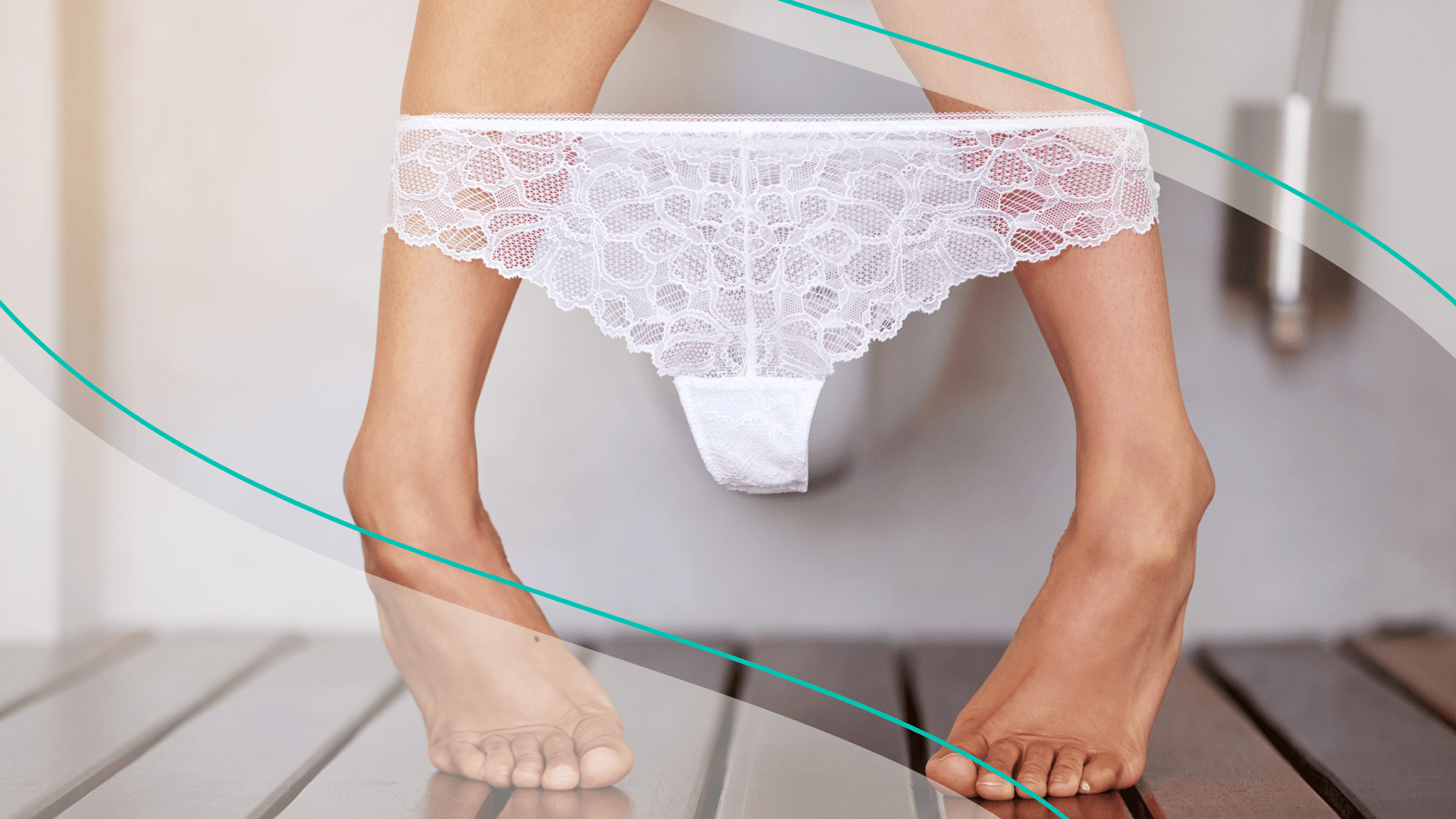The internet is full of trendy and, at times, slightly unhinged “health” practices. While we’re all trying to thrive in our ~wellness era~, it can be hard to distinguish between actually helpful self-care habits and the more questionable ones (looking at you, yoni eggs and perineum sunning). When it comes to your vaginal health, “less is more,” says Dr. Kristen Venuti, an OB-GYN at Northwestern Medicine. We asked her to break down all the things you should stop doing to your vagina, and what you actually need down there instead.
Expert interviewed

Dr. Kristen Venuti - Dr. Kristen Venuti is a board-certified OB-GYN at Northwestern Medicine.
Which feminine hygiene habits should I avoid?
Vajacials and vaginal steaming
Think of a vajacial as a facial for your vulva. Yep, just like the one Molly got in “Insecure.” It typically includes exfoliation, masking, moisturizing, and sometimes even vaginal steaming. That’s where you sit over a basin of herb-infused hot water and let it steam up your vulva. The supposed benefits of a vaginal steaming include balancing hormones, reducing stress, relieving headaches, and boosting fertility. There isn't much research to back any of these claims, though, and some research has found that vaginal steaming could be bad for you.
Why you should skip it
A vajacial might sound like a luxurious spa treatment, but the vulva skin is actually more sensitive than any other part of the body. The products used in the vajacials could cause irritation — even if they are OK for the face.
There’s also a risk of those products throwing off the bacterial environment in the vagina, even when they’re applied only to the vulva. “A lot of times, [a product] starts on the outside and works its way in,” Dr. Venuti says. That could potentially cause an imbalance of bacteria, which may lead to infections, like a yeast infection or bacterial vaginosis.
Steaming is another thing that could mess with the bacteria in your vagina. The heat could kill some of the good bacteria, which may alter the pH balance of the vagina. It’s a “delicate microbiome,” says Dr. Venuti. “[The vagina is] like your gut — you have all this good bacteria in your gut. You wouldn't be steaming or facial-ing your gut.”
Plus, let’s not forget the most obvious risk of sitting over hot steam: Burning yourself. We’re (not) burnin’ up for you, baby.
What you can do instead
Exfoliation and moisturizing the vulva isn’t inherently bad, but you don’t need to start a whole skincare regimen for down there. “Even just using a washcloth just to gently rub [and] cleanse the area,” is more than enough to slough off dead skin, according to Dr. Venuti. When it comes to moisturizing, she says to keep it simple: Aquaphor or Vaseline are just fine.
Vaginal bleaching
Vaginal bleaching is a treatment or product used to lighten the appearance of the vulva skin. That could include topical creams, laser treatments, or chemical peels.
Why you should skip it
It’s unsafe. Even the American College of Obstetricians and Gynecologists think so. Largely because vaginal bleaching could irritate, burn, or cause scarring or inflammation to the vulva.
What you can do instead
The best alternative is “loving your skin color the way it is,” says Venuti. Let us remind you that all bodies look different and they all change with age and life experience. (Just ask anyone who’s ever had a baby.) Vulvas are no exception: They can change in color and appearance over time. The negative impacts of vaginal bleaching also disproportionately affect women of color, and the practice can perpetuate racist and inaccurate beliefs that vulvas need to look a certain way. That said, if you notice any sudden changes to the color of your vulva, reach out to your doctor.
Vaginal soaps and cleansers
Washing your vulva or vagina with soap or a cleanser is on the OB-GYN’s list of ‘things to skip.’ Even if it’s branded as a product for your vagina. “A lot of the stuff that's marketed for vulva and vaginal health is really actually not good for you,” says Dr. Venuti.
Why you should skip it
Some soaps contain ingredients that could irritate your skin, she says. They could also alter the pH balance of the vagina and allow harmful bacteria to grow. All of that could make you more prone to infections.
What you can do instead
Washing yourself with water is enough, says Dr. Venuti. If you really, really want to use a soap, she recommends sticking to a plain white, fragrance-free bar soap — and using it sparingly on the external parts of the vulva.
Vaginal deodorant
Consider this a PSA that vaginas should smell like vaginas, and nothing else. As Dr Venuti puts it: “The vagina is not a rose garden.”
Why you should skip it
Whether you’ve been eyeing deodorants for the vaginal area or swiping regular deodorant down there on sweatier days, you can probably guess why it’s not a good idea: Deodorants can mess with the vagina’s natural microbiome and open the door for infections or irritation.
What you can do instead
Know that your natural scent is just that: natural. It may change in strength or scent at different times, due in part to your fluctuating body temperature and hormones. If something smells particularly off or ‘fishy’, though, it may be a sign of an infection. In that case, make an appointment with your doctor.
Vaginal douching
It’s time to close the doors on vaginal douching, aka spraying water (or anything else) up into your vagina. Douching shouldn’t be confused with simply rinsing the vulvar area, which is generally fine, says Dr. Venuti.
Why you should skip it:
You could upset the natural vaginal microbiome. Plus, if the water gets as far up as your cervix, Dr. Venuti says it could put you at risk of pelvic inflammatory disease.
What you can do instead
Rinse your vulva in the shower and call it a day.
Wiping the wrong way
You may have already heard that there’s a right way and a wrong way to wipe. The general guidance from doctors is to always wipe from front to back.
Why you should skip it
Wiping the wrong way can drag fecal bacteria into your vulvar area, which could lead to a UTI.
What you can do instead:
Stick with the front-to-back wipe, if you can. The ol’ reach-around may not work for everyone, though. So Dr. Venuti says it’s OK to wipe in a way that works for you and your mobility, as long as you’re keeping any fecal matter away from the vulva.
QQ: How do I stop itching down there?
First, make sure you’re not doing anything in the list above. If you’re not, and you’re still experiencing any itching or discomfort, make an appointment with your doctor to see what’s going on.
Sometimes, even if you’re doing everything right, the vaginal ecosystem can still be thrown off. If you have a partner, Dr. Venuti says to ask which products they might be using (like lubes, body washes, moisturizers, etc). She also recommends checking to see if the toilet paper you use has any added fragrances or dyes that might be irritating you.
Got it. Do I ever need to let my vagina ‘breathe’?
Dr. Venuti’s answer: There’s no need to go spread-eagle into the wind. As long as you’re wearing clean, loose-fitting underwear, it shouldn’t be an issue, she explained. Try to avoid hanging out in tight, sweaty clothes, though. That can add extra moisture to the area — which could contribute to discomfort or an imbalance of bacteria.
theSkimm
Vaginas are meant to look, feel, and smell like vaginas — despite what certain cleansers, sprays, and treatments might say. So feel free to remove any special products from your cart and focus on actual vaginal health instead. Meaning: Just let it do its thing.
This content is for informational and educational purposes only. It does not constitute a medical opinion, medical advice, or diagnosis or treatment of any particular condition.
Subscribe to Skimm Well
Sign up here to receive our wellness newsletter (currently in beta), filled with actionable advice, expert-vetted content, product recs, and more — delivered directly to your inbox.
